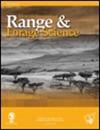Customary ecological conservation of Mwanda-Marungu Pastoral Commons in Taita Hills, south-west Kenya
IF 1.9
4区 环境科学与生态学
Q3 ECOLOGY
引用次数: 4
Abstract
Rural commons in East-Africa have historically played key socio-economic and environmental sustainability. Despite growing interest in this arena, there are still surprisingly few studies that examine rural customary management of pastoral communities in East Africa. This is striking given that this region is an exemplary area for pastoralism and thus ideal for communal systems such as commons. Deficient studies and political support in this area could be linked to widespread prejudice of branding pastoralism as perilous to the environment. We set out to conduct a study to examine and test pastoralists’ customary norms that underpin environmental sustainability/unsustainabity of pastoral commons focusing on Mwanda-Marungu, in Taita hills, Kenya where the first author originates and brought up as a pastoralist up to the age of 24. Through ethnographic approaches and semi-open interviews to 193 respondents conducted in 2019–2021 during water and pasture stress during the dry months of July–October, we examined whether customary governance of Mwanda-Marungu would offer sustainable model that conforms to the IUCN’s Other Effective Area-Based Conservation Measures (OECMs). Our study showed that pastoral communities in this area have been developing inventive measures for generations that improve good management and ecological protection. These may be tied to the principles of OECMs which contests the misconception about pastoralism.肯尼亚西南部泰塔山姆旺达-马龙古牧区的传统生态保护
东非的农村公地历来发挥着关键的社会经济和环境可持续性作用。尽管人们对这一领域的兴趣日益浓厚,但对东非牧民社区的农村习惯管理进行审查的研究仍然少得惊人。考虑到该地区是畜牧业的典范地区,因此是公地等公共系统的理想选择,这一点令人震惊。在这一领域缺乏研究和政治支持,可能与将畜牧业标榜为对环境有害的普遍偏见有关。我们着手进行一项研究,以考察和测试牧民的习惯规范,这些规范支撑着牧区公地的环境可持续性/不可持续性,重点是第一作者来自肯尼亚泰塔山的姆旺达-马龙古,那里是一名24岁的牧民。通过民族志方法和对193名受访者进行的半公开访谈,我们在2019-2021年7月至10月干旱月份的水和牧场压力期间,研究了姆旺达-马伦古的习惯治理是否会提供符合世界自然保护联盟其他有效区域保护措施(oecm)的可持续模式。我们的研究表明,该地区的牧区世代以来一直在制定创新措施,以改善良好的管理和生态保护。这些可能与oecm的原则有关,该原则反对对畜牧业的误解。
本文章由计算机程序翻译,如有差异,请以英文原文为准。
求助全文
约1分钟内获得全文
求助全文
来源期刊

African Journal of Range & Forage Science
ECOLOGY-ENVIRONMENTAL SCIENCES
CiteScore
4.00
自引率
14.30%
发文量
35
审稿时长
>12 weeks
期刊介绍:
The African Journal of Range & Forage Science is the leading rangeland and pastoral journal in Africa. The Journal is dedicated to publishing quality original material that advances rangeland ecology and pasture management. The journal aims to publish research of international importance from any region, but as an African journal, we are particularly interested in research from Africa and relevant to the continent. The Journal promotes both science and its application and authors are encouraged to explicitly identify the practical implications of their work. Peer-reviewed research papers and research notes deal primarily with all aspects of rangeland and pasture ecology and management, including the ecophysiology and biogeochemistry of rangelands and pastures, terrestrial plant–herbivore interactions (both domestic and wild), rangeland assessment and monitoring, effects of climate change on rangelands, rangeland and pasture management, rangeland rehabilitation, ecosystem services in support of production, conservation and biodiversity goals, and the identification and development of intensive and semi-intensive pasture and forage resources to meet livestock production needs. Articles highlighting transdisciplinary linkages among biophysical and social sciences that support management, policy and societal values are particularly encouraged. The Journal includes relevant book reviews and invited perspectives that contribute to the development of range and forage science. Letters to the editor that debate issues raised in the Journal are acceptable. The African Journal of Range & Forage Science is the official journal of the Grassland Society of Southern Africa.
 求助内容:
求助内容: 应助结果提醒方式:
应助结果提醒方式:


